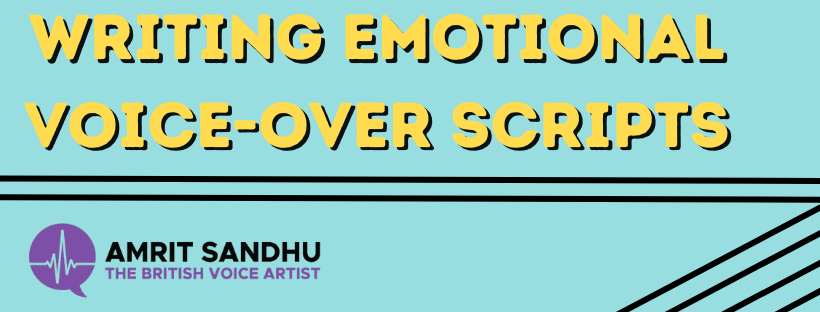Emotional voice-over scripts are an excellent form of script that can really grab your audience’s attention. However, it can be tricky to write if you have never dealt with one before.
Luckily, it does not have to be hard when you know all the right information. I have created a list of tips that you can follow to create a wonderful emotional voice-over script that will capture your listener’s hearts.
What’s the Purpose of Making an Emotional Script?

An emotional script’s purpose is to move your audience emotionally, engaging them into your script by making them feel. The emotion in your script is almost like a “hook” that will grab your audience’s attention.
Making people feel emotions is another way to pique their interest. The audience can get emotionally invested in your story, and they will want to hear more about what your script has to say.
Creating an Emotional Voice-Over Script
So, how do you write an emotional voice-over script? I’ve got the tips you need, and here are some that you can incorporate into your script.
Offer Solutions to Solve Emotional Worries
Problems in our lives can often make us feel an array of emotions, and you can use that as a “hook” to get people interested. This is an excellent tip to follow if you are promoting a product or service with your script. You can make your script relatable by addressing this problem with an emotional note.
For instance, you can mention how their problem is making them feel stressed and worried. Once you address the problem, you can say how your product/service can be a solution to their problems.
Here’s an example using a script talking about vitamins to promote energy:
“The daily stresses of our lives can bring us down, and it can be tough to have enough energy to get through the day. Luckily, you can get your energy back. Our product features all the vitamins you need to give you the boost to make the most out of every day.”
The line directly addresses a problem that the audience is likely having then it is quickly followed up with a solution, which was the vitamins. This helps the audience get the message quickly that their issue can easily be gone with this product.
Create a Story

One of the best ways to structure any kind of script, especially an emotional one, is to create a story. People are naturally inclined to listen to people who are telling stories, so do not be afraid to incorporate that into your script.
For this article, we will focus on the three-act structure of a story: the setup, confrontation, and ending.
You need to make sure that your story has these three parts to make it complete. Otherwise, your listeners may feel like there is something missing.
The setup is where you introduce the basics to your story, which include any possible characters, a situation, etc. You need to give your audience an idea of the story to encourage them to keep listening.
Next, you need to introduce the confrontation, which is the main plot of your story. The confrontation is important because it will help keep the listeners interested until the end of the story.
The plot can be anything you like, but for emotional scripts, you would likely want to create a problem that is causing the audience or characters in your story to feel something. You want to pick a problem or situation that makes the listener wonder how it will get resolved.
Finally, you can create the ending, which should be a form of a resolution from the problem. Make sure that your ending ties up any loose ends neatly. That way, your audience will not feel unsatisfied after listening to your whole script.
When writing your resolution, think about what your script is for. Are you promoting a product or service? Are you trying to spread brand awareness?
These factors will help you decide how to create your ending. For instance, you can repeat your brand’s message at the end of the resolution to make it the last thing the audience remembers. You could also use a product or service that you’re promoting to be the resolution to the problem.
Use Your Words Wisely
You would imagine that an emotional script would use a lot of flowery words to make the audience feel something, right? Well, it is always better to listen to the old saying, “less is more.”
When you want to evoke emotions, you don’t want to try too hard. Otherwise, that can turn your audience off from your words.
Instead, you need to carefully select your words to create the most impact with fewer sentences. That way, your audience will easily remember what you said, giving greater emphasis to the meaning of the words rather than how many words.
Here’s a comparison of a long sentence versus a shorter one:
Long: Have you ever wondered what it would be like to freely live without woes or worries burdening your mind constantly?
Short: Do you ever wonder what it’s like to live free of worries?
The shorter sentence says the same thing as the longer sentence, but it gets the point across much faster. Shorter sentences are often received better by people because they are easier to remember and understand.
Add Visual Cues If You Can

If you are writing a script for something that will have visuals, take full advantage of it. Remember how I mentioned that less is more when it comes to words? Well, you can add visual cues to help you use fewer words in your script while intensifying the message.
If you get the pick which visuals will go with your script, picture them as you write. You can also write notes of possible images or videos that can go alongside the audio.
If you already have a video ready that you need to write a script for, watch it carefully. Try to see what words can amplify the given visuals without overpowering them.
For example, your visual cues could focus on the color red, which means passion and confidence. You can pick words that would match the visuals shown, choosing words that compliment the visuals.
Let’s say that you’ve got mostly red visuals. You would accompany those visuals by picking strong and passionate words, like “vibrant,” “motivated,” and so on.
Offer Trust
One of the most effective methods to successfully use emotions in your script is to offer trust to your audience, especially if you are promoting a company. Customers only purchase repeatedly from brands that they trust, so using trust and emotions in your script can be an excellent move.
So, how do you show customers that they can trust you through a script? Try to avoid being upfront and saying that, “We are trustworthy.” Instead, offer facts and transparency because people value authenticity.
For instance, show testimonials from past customers that prove that you are an excellent business worthy of people’s trust. You can show how your business helped a customer improve their life, and how you can do the same for them.
You can also show them other facts that prove you are reliable as a company. For example, you can show statistics that show your success rate, how many sales you’ve made in the past year, etc.
It Is All in the Artist

One of the key aspects to making a great emotional voice-over script will rely on the voice actor. You can have the best possible script on your hands, but what good will it do if you have the wrong voice actor?
Voice artists often “specialize” in certain voice-acting genres. Think about how Arnold Schwarzenegger best fits action roles. While voice actors can adapt to suit a specific project, it is important to hear their samples before hiring them/
For instance, let’s say you want the viewers to feel warm and calm throughout the script. You would likely want to pick a calmer and softer voice to create a more intimate feeling.
Let’s say that you want more serious and deeper tones of emotion throughout your script. In that case, you may want a deeper voice to match that.
Additionally, the voice artist you choose must have excellent acting skills, not just narration skills. Anyone can read a script, but acting as a character to make the audience feel emotions and relate to the story will involve acting.
Do you have any useful tips to help people write excellent emotional voice-over scripts? Don’t be shy and share them in the comments section down below!



